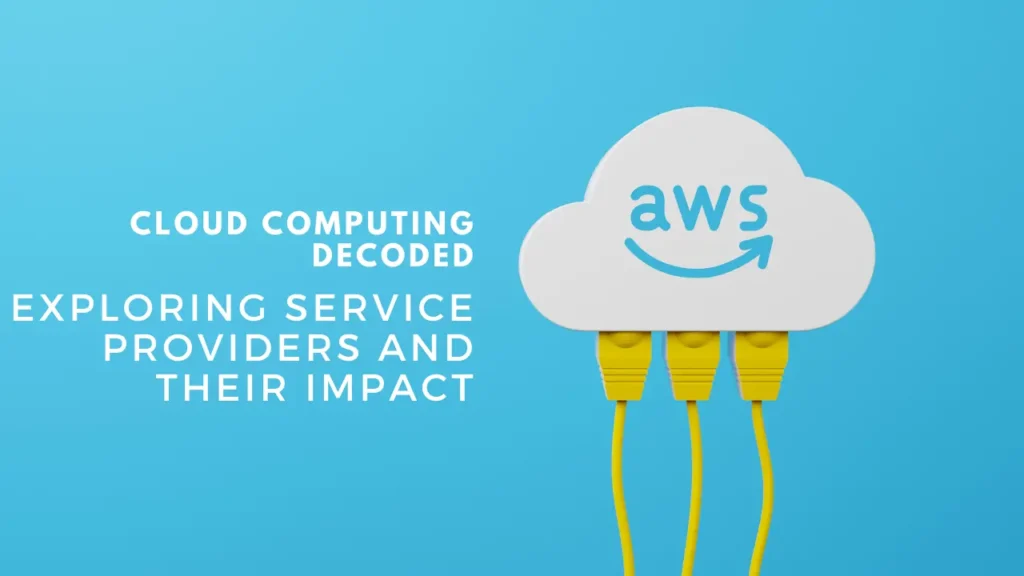Cloud computing has revolutionized how businesses operate by providing scalable and flexible computing resources over the Internet. It allows organizations to access and utilize computing power, storage, and software applications on-demand without requiring extensive on-premises infrastructure. One of the vital elements of cloud computing is the presence of service providers who offer these resources and services to businesses and individuals. This article tell us about the concept of service providers in cloud computing, the major players in the industry, and the benefits of utilizing their services.
What is Cloud Computing?
Before diving into the specifics of service providers, learning the basic concept of cloud computing is essential. In simple terms, cloud computing refers to delivering computing services over the Internet. These services can include infrastructure (IaaS), platforms (PaaS), and software applications (SaaS). Instead of investing in physical servers, networking equipment, and software licenses, businesses can leverage the infrastructure provided by cloud service providers.
Service Providers in Cloud Computing
The cloud computing market has been dominated by several big service providers who provide various services that meet the various requirements of businesses and individuals. Let us explore some of the leading market players:
Amazon Web Services (AWS)
AWS, a subsidiary of Amazon.com, is the leading cloud service provider in market share. They offer various services, including computing power, storage, databases, machine learning, and more. With a global presence and a robust infrastructure, AWS caters to businesses of all sizes, from startups to large enterprises.
Microsoft Azure
Microsoft Azure is another major player in the cloud computing space. Leveraging Microsoft’s extensive experience and technology stack, Azure provides various services, including virtual machines, databases, artificial intelligence, and Internet of Things (IoT) solutions. Azure is known for its strong integration with Microsoft products and services, making it a popular choice for organizations already using Microsoft technologies.
Google Cloud Platform (GCP)
Google Cloud Platform (GCP) is Google’s cloud service offering that provides infrastructure, data analytics, machine learning, and other cloud-based services. GCP is known for its robust and scalable infrastructure, advanced data analytics capabilities, and strong AI and machine learning offerings. It mainly attracts businesses seeking to leverage Google’s expertise in these areas.
Benefits of Using Service Providers
Utilizing service providers in cloud computing brings numerous benefits to businesses. Here are some key advantages:
Scalability and Flexibility
Service providers allow businesses to scale their computing resources up or down based on demand. This flexibility eliminates the need for investing in and managing expensive on-premises infrastructure that may go underutilized during periods of low demand. With service providers, businesses can easily adjust their resources to align with their current needs.
Cost Efficiency
Cloud computing offers cost advantages over traditional on-premises infrastructure. Instead of significant upfront investments, businesses can pay for cloud services on a pay-as-you-go basis. This pay-per-use model enables cost optimization by eliminating the need for overprovisioning resources. Additionally, businesses can avoid hardware maintenance, software upgrades, and data center management costs.
Reliability and Availability
Service providers operate multiple data centers across various locations, ensuring high availability and redundancy. They employ robust infrastructure and disaster recovery mechanisms to minimize the risk of service disruptions. By leveraging the service provider’s infrastructure, businesses can achieve higher levels of reliability and minimize the impact of hardware failures or natural disasters.
Security
Cloud service providers implement robust security measures to protect customer data. They invest heavily in security controls, encryption, and access management to safeguard sensitive information. With experienced security teams and regular security audits, service providers offer more data protection than many businesses can achieve independently.
Choosing the Right Service Provider
When selecting a service provider for cloud computing, there are several considerations to remember. The right provider will depend on the specific requirements of your business. Here are some factors to consider:
Considerations for Small Businesses
For small businesses, cost efficiency and ease of use are often essential. Look for service providers that offer affordable pricing plans, free tiers for testing, and user-friendly interfaces. It is also crucial to consider customer support and the availability of resources for learning and troubleshooting.
Considerations for Enterprises
Enterprises may have more complex requirements, such as high-performance computing or compliance with industry regulations. In these cases, evaluating the provider’s infrastructure capabilities, network bandwidth, and compliance certifications becomes crucial. Look for providers with a strong track record in serving enterprise clients.
Evaluating Service Level Agreements (SLAs)
Service Level Agreements (SLAs) define the terms of service, performance guarantees, and support commitments the provider offers. Carefully review the SLAs to understand the service uptime, issue response times, and data protection guarantees. Consider the provider’s SLA about your business’s criticality and requirements.
Conclusion
Service providers play a crucial role in enabling businesses to leverage the benefits of cloud computing. They offer scalable infrastructure, vital services, and cost-efficient solutions that eliminate the need for extensive on-premises infrastructure. When choosing a service provider, carefully evaluate their offerings, consider your business’s requirements, and ensure alignment with your goals. By partnering with the right service provider, businesses can unlock the full potential of cloud computing and drive innovation.
FAQs
- What is the difference between public and private cloud service providers? Public cloud providers offer resources and services to multiple customers over the Internet, while private cloud providers offer dedicated resources to a single organization. Public cloud providers are generally more cost-effective, while private cloud providers offer increased control and security.
- Can I switch service providers easily? Switching service providers can be a complex process, depending on the level of integration with your current infrastructure and applications. Planning and assessing the migration process is essential, considering factors such as data transfer, compatibility, and potential downtime.
- How do service providers ensure data security in the cloud? Service providers implement robust security measures, including encryption, access controls, and regular security audits. They also comply with industry standards and certifications to protect customer data.
- What are some popular applications of cloud computing? Cloud computing is used in various applications, including web and mobile app hosting, data storage and analysis, artificial intelligence and machine learning, collaboration tools, and virtual desktop infrastructure (VDI).
- Are there any disadvantages to using service providers in cloud computing? While cloud computing offers numerous benefits, there are some potential disadvantages. These include dependency on the Internet, potential vendor lock-in, limited control over infrastructure, and concerns about data privacy and regulatory compliance.



